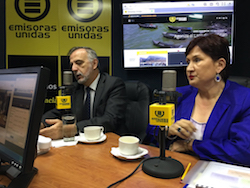The head of an internationally supported anti-corruption body says Guatemala is facing a problem of “structural corruption,” suggesting that allegations of widespread graft in the country’s previous presidential administration are anything but isolated incidents.
Iván Velásquez, head of the United Nations-backed International Commission against Impunity in Guatemala (Comisión Internacional Contra la Impunidad en Guatemala – CICIG), made the comments in a June 6 interview with the radio program “A Primera Hora.”
Velásquez spoke about the charges brought last week against former Guatemalan president Otto Pérez Molina and former Vice President Roxana Baldetti, which accuse the pair of accepting illegal campaign contributions to help them win the 2011 election. Once in office, they allegedly returned the illicit favors by awarding public works contracts to donors.
Pérez Molina and Baldetti are currently jailed on corruption charges related to a tax-evasion and bribery scheme known as “La Linea.” Pérez Molina is also accused of accepting bribes from a Spanish company in exchange for steering a major port development contract toward that firm.
According to Velásquez, whose organization supported these investigations, the problem of corruption in Guatemala is not limited to Pérez Molina and Baldetti’s Patriot Party.
Rather, he said, “it is a corruption that is much more rooted to the point that it could be, hypothetically, that these consolidated structures have remained in the country [and] in the government, and can even reach relationships and understandings with each government, for cyclical corruption.”
Velásquez made similar comments in a June 6 interview with German news outlet Deutsche Welle.
“There is no evidence to suggest that the corrupt structures have been dismantled,” he said.
InSight Crime Analysis
A source in CICIG who asked not to be identified told InSight Crime that it would take time to address the systemic corruption in Guatemala. The source, who said he was not authorized to speak publicly, called campaign finance “the original sin,” adding that once politicians have taken the money they have to find a way to repay their benefactor.
“In this way you substitute the public interest for the interests of certain elites who finance the campaign,” the source said.
SEE ALSO: Coverage of Elites and Organized Crime
Echoing some of Velásquez’s comments, the CICIG source also said the cases that have been brought with the anti-corruption body’s support “shine a light on the problem, but they don’t solve the whole problem.”
“The system of corruption is so profound, with deep roots, that it does not depend on any one case or any one person,” the source said. “It can change, adapt with great speed.”
Guatemala ranked 123 out of 167 countries in Transparency International’s 2015 Corruption Perceptions Index survey. The only countries in the Americas that scored worse were Venezuela, Haiti, Paraguay and Nicaragua.

